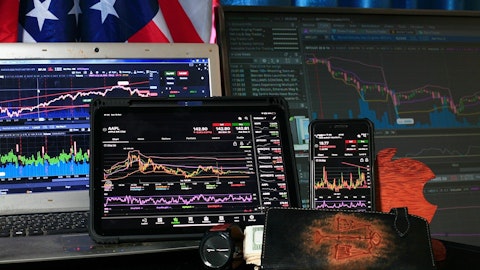3. Western Digital Corporation (NASDAQ:WDC)
Short Interest as % of Shares Outstanding: 5.08%
Number of Hedge Fund Holders: 80
Western Digital Corporation (NASDAQ:WDC), a major data storage company, is a key player in the storage industry, which is known for its broad range of essential data storage products. The company has carved out a significant role in the 5G landscape with its advanced storage solutions, which cater to the needs of 5G-enabled devices and applications.
A standout product in this area is the iNAND MC EU511 embedded flash drive (EFD), designed to meet the demanding performance standards of next-generation mobile devices that utilize 5G technology.
The company is focused on supporting 5G technology, which is clear from its engagement in developing high-performance edge storage solutions. As 5G networks promise faster speeds and lower latency, the need for high-capacity storage to manage the massive data generated by billions of Internet of Things (IoT) devices grows.
The company’s iNAND MC EU551 and EU311 models are designed to provide superior read and write speeds, which are necessary for data-heavy applications and strengthen its position in this rapidly evolving market.
At a stake value of over $4.057 billion, 80 hedge funds held positions in Western Digital (NASDAQ:WDC) in the second quarter. As of June 30, Millennium Management is the most significant shareholder in the company and has a position worth $379.707 million.
The company has faced several challenges that have impacted its financial performance. In the fourth quarter of fiscal 2024, it reported revenue of $3.76 billion, which shows a 9% sequential increase. Despite this growth, the company reported a non-GAAP loss per share of $1.72 for the fiscal year, which is possibly a sign of ongoing issues with profitability. It ranks 3rd on our list of the worst 5G stocks to buy according to short sellers.
The market response to the company’s financial performance has been mixed. On August 1, Summit Insights downgraded the stock from Buy to Hold as it noted that while there have been improvements in average selling prices and gross margins, profitability enhancements are still limited. Summit Insights also suggested that the storage and flash industry might be nearing the end of its recovery phase.
On September 10, Goldman Sachs maintained a Neutral rating with a $79 price target, following a presentation at the Communacopia & Technology conference where it was highlighted that enterprise SSD demand, driven by AI, remains strong and is expected to contribute significantly to the company’s NAND bits in the coming fiscal year.
Meanwhile, on the same day, Citi analyst Asiya Merchant lowered the price target from $95 to $85 but maintained a Buy rating, as they acknowledged the volatility in NAND fundamentals while remaining positive about the supply/demand dynamics.
Despite these hurdles, Western Digital (NASDAQ:WDC) has made significant progress in innovation. The company has introduced new high-capacity SSDs aimed at gaming and enterprise applications, and its strong foothold in the enterprise SSD market has driven revenue growth, particularly due to rising demand for cloud storage solutions.
The company projects first-quarter fiscal 2025 revenue between $4 billion and $4.2 billion, which signals a hopeful outlook for continued growth despite the current challenges. The management team remains dedicated to enhancing profitability while navigating a complex business environment.
Parnassus Investments stated the following regarding Western Digital Corporation (NASDAQ:WDC) in its Q2 2024 investor letter:
“We re-initiated a position in Western Digital Corporation (NASDAQ:WDC), a manufacturer of memory semiconductor chips and hard disk drives, as we believe earnings expectations are far too low. Semiconductors have been another of our most-alpha-generative industries, thanks to the industry’s secular tailwinds and our in-house expertise. Western Digital stands to benefit from the rapid growth of memory-hungry AI applications. The valuation for Western Digital was low relative to its peers, giving us a way to participate in AI at a reasonable valuation.”





